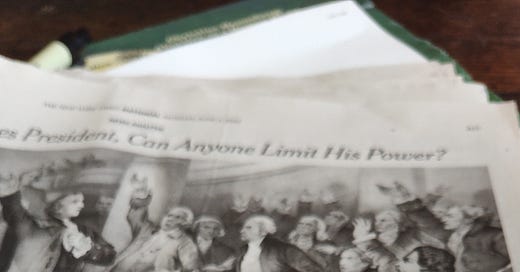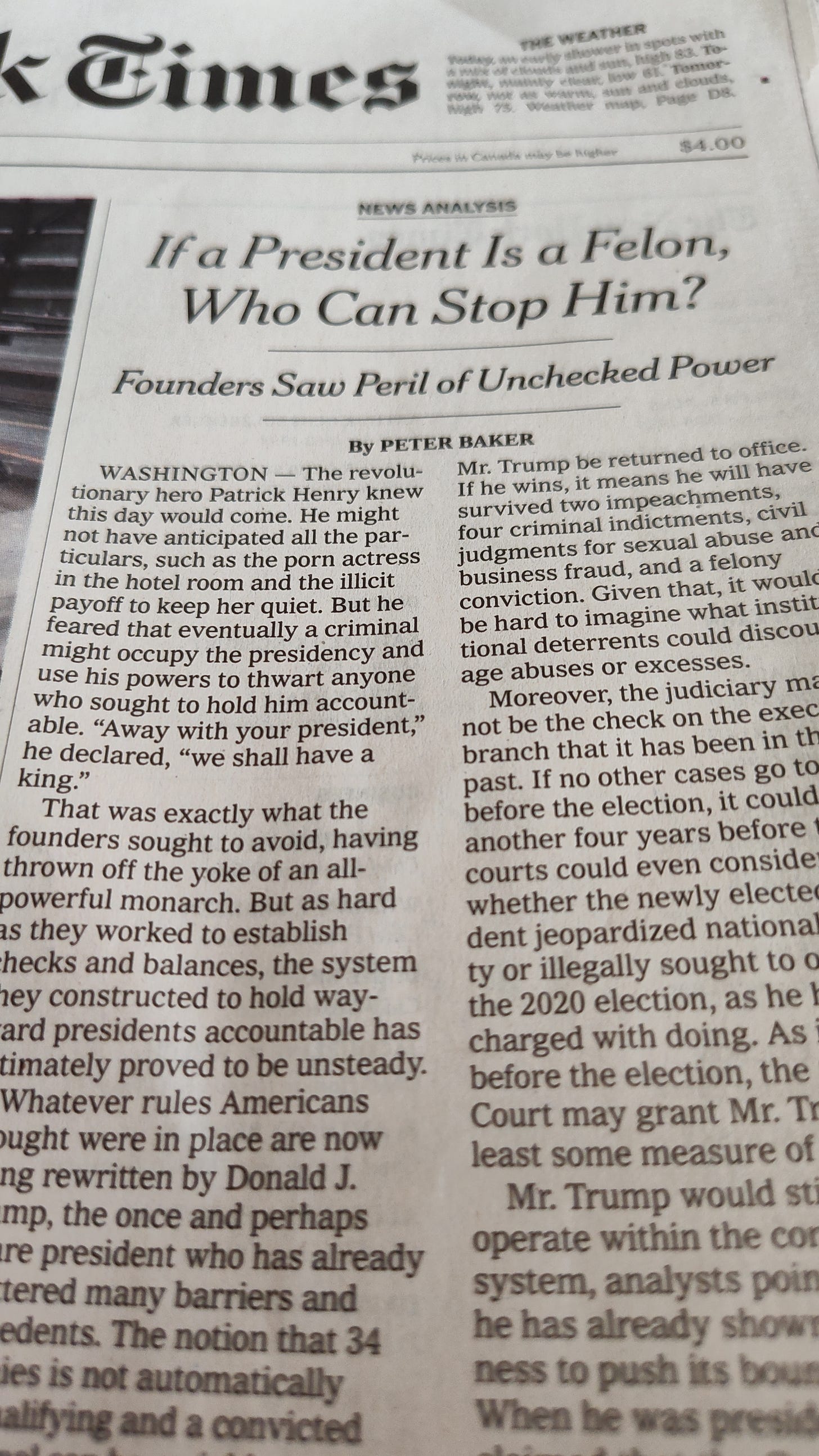Trump, "The New York Times," Patrick Henry, and Some Bad, Bad History
When I find myself thinking "we're toast," this is the kind of thing I mean.
TEMPORARILY UNLOCKED
Invoking the U.S. founders is almost always lame, but the wrongheadedness of this instance by Peter Baker, at the top of the front page of today’s New York Times, really takes the cake. The newsflashy subhead is merely banal—“Founders Saw Peril of Unchecked Power” (hm, yes, so true )—but the lead reflects total ignorance of the most basic elements of the founders’ thinking.
And did I mention it’s at the top of the front page?
Quoting Patrick Henry out of context regarding the dangerous potential for U.S. presidents to become tyrants, Baker gives Henry the epithet “revolutionary hero,” no doubt thinking of the famous “Give Me Liberty or Give Me Death” speech of 1775, and makes him a representative of “the founders” in general. But the quote here is from a speech in 1788—well-documented, unlike the earlier one—in which Henry passionately urged Virginians not to ratify the U.S. Constitution.
He saw it as a thoroughly tyrannical document. The potential of the president to become a monarch was only one example. Henry didn’t like the House, the Senate, the judiciary, or the whole idea of forming a strong national government in the first place: he’d boycotted the Constitutional Convention. If the Constitution were to become law, he was now arguing, liberty in America would become a thing of the past.
In the quoted speech, Patrick Henry was going up against the founders—not reflecting their thinking.
Anyone with a search engine can find out in two seconds that Patrick Henry was the leading Antifederalist. In the case of this Times article, it’s clear that the search was only for a relevant quote on the presidency from a “founder,” but having found such a quote, couldn’t you take just a moment to skim the source and check its purport? To find out that the tyranny Henry’s talking about also applies to the legislature? that he thinks national majority rule is the kiss of death?
I mean, at The New York Times?
Maybe explore just a tad further and see that in his next speech on the subject, Henry did his best to scare Virginians by warning them that among the horrors of the Constitution was a power of the federal government to “liberate every one of your slaves, if they please”?
And maybe realize, in about two minutes of searching, that if you want a founder quote on the risk of the great and noble Constitution’s being demolished by a monarchical president, Patrick Henry is not your man?
(Maybe Baker and his Times editors do think the Constitution as a whole is, as the revolutionary hero Henry put it, “horribly frightful.” If so, then they don’t need to be so busy “analyzing” its possibly being overturned by Trump.)
What’s wrong with all this isn’t the vapidity of the lead, just in itself—it’s the unintentionally funny contrast between the characteristic Times style of intoning away informatively about how things were in the past and the unwitting exposure of a total lack of interest in anything about the past. The joke is compounded by Baker’s seemingly smart-sounding qualifying remarks. “[Henry] might not have anticipated all the particulars,” Baker concedes, “such as the porn actress in the hotel room and the illicit payoff to keep her quiet.” But as the historian Claire Potter noted on Twitter, that’s just the kind of thing that not only Henry but everybody of his type would have taken as given. A lot of them did stuff like that—it’s the getting caught that would have surprised them.
The ensuing analysis is as banal as the subhead. There’s nothing new to be learned here, a fact might as well have been flagged by the discursive yet totally wrong package that is the lead paragraph, revealing a vast expanse of sheer emptiness lurking within a brittle pomposity of style.
And that’s not so funny, to me.
Just when I think I can’t be any more shocked and depressed by the condition of the liberal culture that I think we have no choice but to depend on, a front-page Times piece encapsulates everything that, for almost a decade now, has made #resistance discourse so resoundingly hollow, so compulsively repetitious, so utterly ineffectual. If you believe some degree of critical judgment and honest intellectual exploration are necessary to fending off the darkest tendencies everywhere around us, then the intellectual bankruptcy on display here reflects a total disaster.
It’s not just Baker. Since 2016, liberal historians have been invoking the founders against Trump, again and again, to no good purpose. The Baker piece ends with a quotation from the historian Lindsay M. Chervinsky, which Baker turns to his purposes, to the effect that we’ve been lucky that most previous presidents have “comported themselves with dignity, or at least respected the dignity of the office.”
I don’t think Baker is alone in linking, here, the norm-breaking indignity of Trump’s affect with Trump's tendency toward despotism. But they're not linked. Tendencies toward despotism can be seen in the administrations of Washington and John Adams, and both, obsessed with the dignity of the office, conducted themselves accordingly.
But to end on an up note:
I like Patrick Henry.
Yes, he was a slaveholding, land-speculating classic Virginia greedhead of the day, who styled himself, wrongly, a protector of the common man. But in certain areas, he was intellectually honest, and many others in the founding generation were not. (In certain areas. I don’t think he really thought there was any risk that the federal government would liberate the enslaved people of Virginia!) Henry hated the Constitution because he thought provisions like the necessary-and-proper and interstate-commerce provisions gave the federal government virtually unlimited power over the states. The document was ratified anyway, and imagine Henry’s fury, in the 1790’s, when James Madison, having bent every effort in the late 1780’s to criticize all fears of excessive federal dominance, decided he didn’t like what Washington, Hamilton, Adams, et. al., had been doing and started claiming that the states could constitutionally nullify federal law.
No, Henry reminded him. States can’t do that. That’s why I told you not to promote and ratify this thing. But you did, and now it’s the law. Overturn the government or suck it up.
That, I like.
___________
Further Reading
the Henry speech Baker quotes




“ I don’t think Baker is alone in linking the norm-breaking indignity of Trump’s affect with Trump's tendency toward despotism, and they're not linked.” 🎯